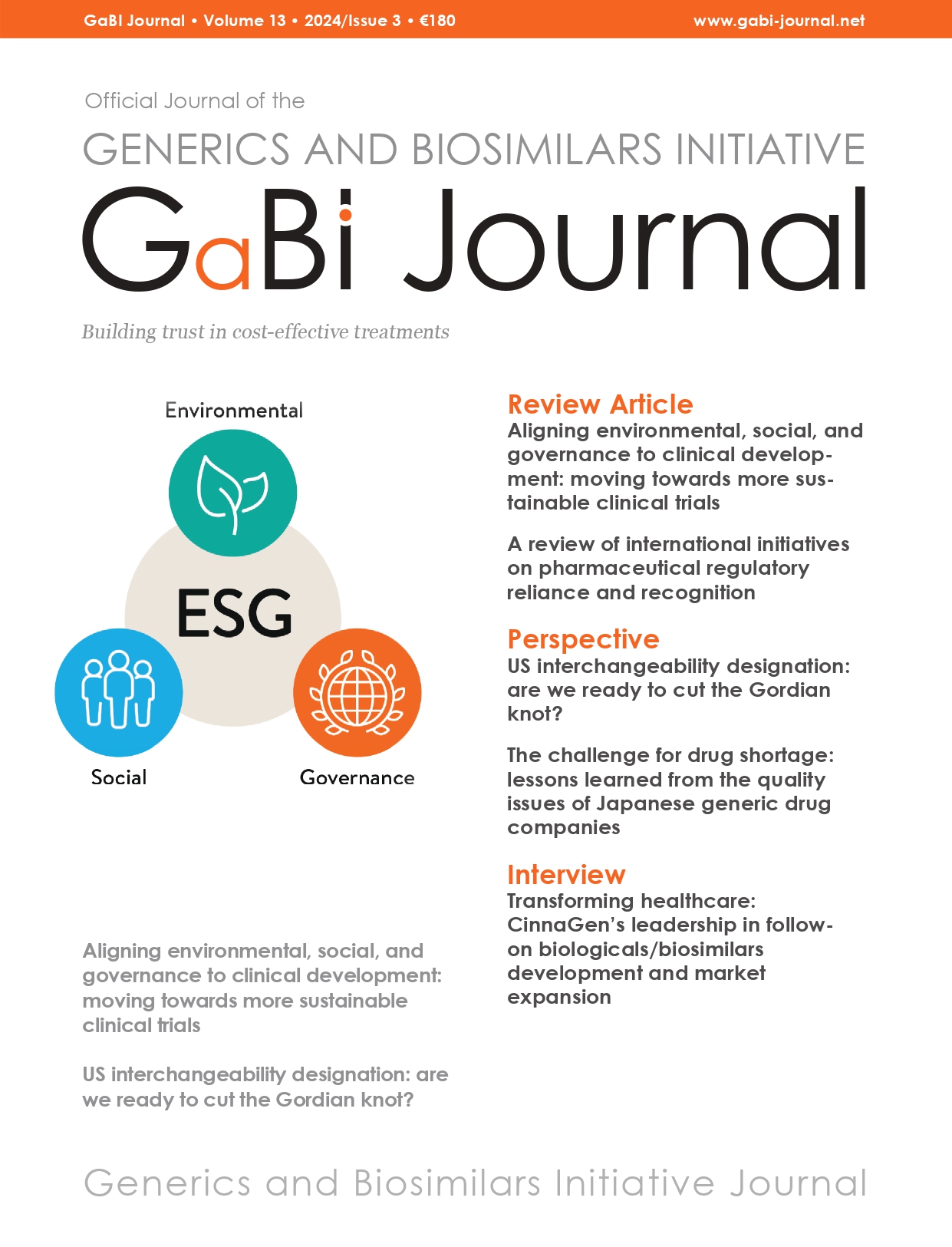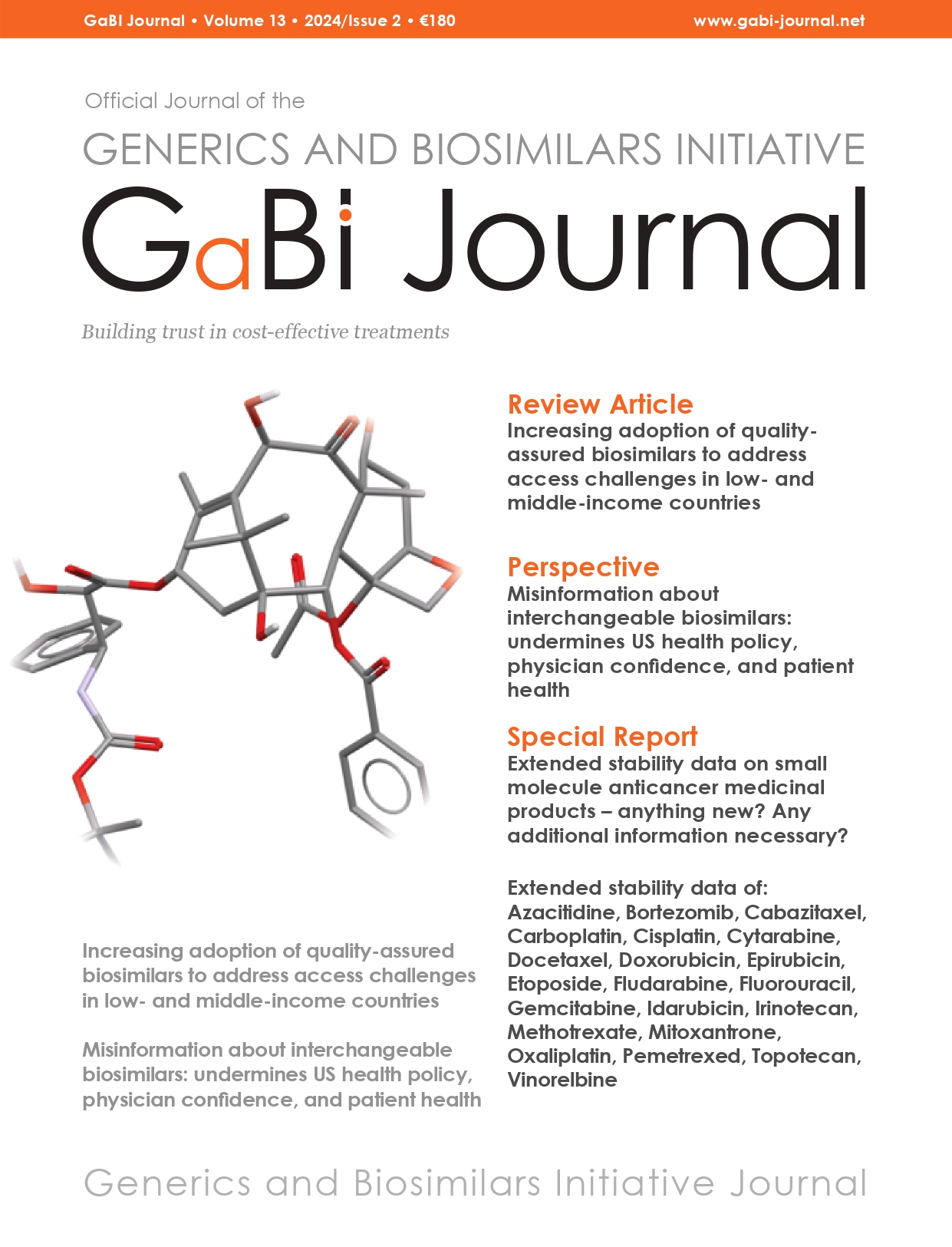A call for coherence in EU legislation to promote generics
Published on 2018/06/01
Generics and Biosimilars Initiative Journal (GaBI Journal). 2018;7(2):92.
Submitted: 6 May 2018; Revised: 7 May 2018; Accepted: 8 May 2018; Published online first: 18 May 2018
Data and market exclusivity for originator medicines in the European Union (EU) create a barrier to market entry for generic medicines. Legislation means that generics cannot reach the market for at least 10 years following the originator marketing authorization. There are no exceptions to this rule which is a cause for concern for many EU Member States. Even high-income countries struggle to afford high-cost medicines under patent to the detriment of patients and overall health care. A recent study published in the Journal of Pharmaceutical Policy and Practice, looks at the current state of EU pharmaceuticals legislation and creates a proposal for greater coherence in this legislation [1].
Regulation concerning the marketing authorization of a generic medicine in the EU currently prohibits the use of the originator’s preclinical and clinical test data for an eight-year period. This is data exclusivity. Following this, market exclusivity means that a generic medicine in the EU cannot then reach the market until 10 years after the originator marketing authorization has passed. In some cases, an additional one year of market exclusivity can also be granted. There are no exceptions made to this rule, which is also known as the 8+2+1 rule.
Current EU medicines legislation goes beyond the requirements of the World Trade Organization (WTO) Trade-Related Aspects of Intellectual Property Rights (TRIPS) Agreement Art. 39.3. The TRIPS Agreement was set up to protect undisclosed test data in registration submissions of new chemical entities against unfair commercial use. However, it does not require countries to grant originator companies exclusive rights over data related to marketing approval. The legislation in place in the EU does grant such exclusive rights, creating an obstacle to the effective use of compulsory licensing.
As part of the WTO TRIPS Agreement, governments can allow third parties or themselves, the right to use a patent without the patent holder’s permission. Such TRIPS flexibilities were clarified in the 2001 WTO Doha Declaration on the TRIPS Agreement and Public Health. This has since resulted in low- and middle-income countries making use of these flexibilities to enable the supply of low-cost generic medicines for the treatment of HIV (human immunodeficiency virus). These flexibilities have a lot of potential which is being taken note of by many WTO countries. Since 2001, the UN High Level Panel on Access to Medicines has recommended their use and that legislation be implemented to enable compulsory licences to be issued that are ‘designed to effectuate quick, fair, predictable and implementable compulsory licenses for legitimate public health needs’.
The EU is yet to make use of TRIPS flexibilities. However, many European health services are currently being restricted by the high price of patented medicines. This results in reduced or denied access to certain medicines in many Member States. There have been requests for governments to address patent barriers made by many higher-income EU Member States.
In the EU, it is possible for individual nations to issue a compulsory licence to overcome patents. However, the regulatory requirements for marketing authorization within the EU, that include data exclusivity, are a matter of European pharmaceutical legislation. These systems together, lack coherence. This has led to cases such as that which occurred in Romania in 2016. Here, the Romanian Government considered issuing a compulsory licence for sofosbuvir, which is used to treat hepatitis C. However, in accordance with EU legislation, it is not possible to register a generic version of this medicine until 2022 due to data exclusivity, meaning that a compulsory licence could not be issued.
Some voluntary licences include a data exclusivity waiver to ensure effective availability of generic medicines. Such waivers are also provided in some middle- and high-income countries that are members of the WTO. These hope to aid generic medicines registration and sales when required to protect public health. They are explicit medicines regulations data exclusivity waivers or relate to the use of compulsory licences in the patent laws of different countries. Data exclusivity waivers are in existence in some non-EU countries including Chile, Colombia, Guatemala and Malaysia and should be considered in the EU.
In the US, data and marketing exclusivity rules are similar to those in the EU. Small molecule generics have a marketing exclusivity period of five years and this is 12 years for biologicals, with a data exclusivity period for the first four. In 2007, the US New Trade Policy authorized a public health exception to data/market exclusivity in the event of a compulsory licence or other requirements of public health. This allows countries that have signed US developing-country free-trade agreements to disregard data/marketing exclusivity as long as they take measures to protect public health. This can occur even in circumstances where a compulsory licence should be issued, however, its implementation does depend on the status of the patent of the medicine being considered.
In the EU, data and market exclusivity waivers do exist in accordance with the ‘EU regulation on compulsory licensing of patents for the manufacture of pharmaceutical products for export to countries with public health problems outside the EU’. Some EU trade agreements include provisions that can enable exceptions to exclusivity for reasons of public interest or under situations of national emergency or extreme urgency. Under these circumstances, third parties can be allowed access to certain data. Such an agreement exists between the EU and Peru.
Overall, despite the right that EU governments have to grant compulsory licences, there is a lack of legal coherence within the EU which prevents generic medicines being able to enter the market early. This is primarily due to data exclusivity and a lack of data exclusivity waivers. EU governments should attach conditions to licensing that enable the use of waivers within the EU and EU legislation needs to be amended to facilitate this. Such waivers do exist for pharmaceutical products exported from the EU. The burden on health budgets across the EU is considerable and EU law needs to act to ensure that there is easy access to new essential medicines to protect and promote public health.
Competing interests: None.
Provenance and peer review: Article abstracted based on published scientific or research papers recommended by members of the Editorial Board; internally peer reviewed.
Alice Rolandini Jensen, MSci, GaBI Journal Editor
References
1. ‘t Hoen EFM, Boulet P, Baker BK. Data exclusivity exceptions and compulsory licensing to promote generic medicines in the European Union: A proposal for greater coherence in European pharmaceutical legislation. J Pharm Policy Pract. 2017;10:19.
Disclosure of Conflict of Interest Statement is available upon request.
Copyright © 2018 Pro Pharma Communications International
Permission granted to reproduce for personal and non-commercial use only. All other reproduction, copy or reprinting of all or part of any ‘Content’ found on this website is strictly prohibited without the prior consent of the publisher. Contact the publisher to obtain permission before redistributing.


